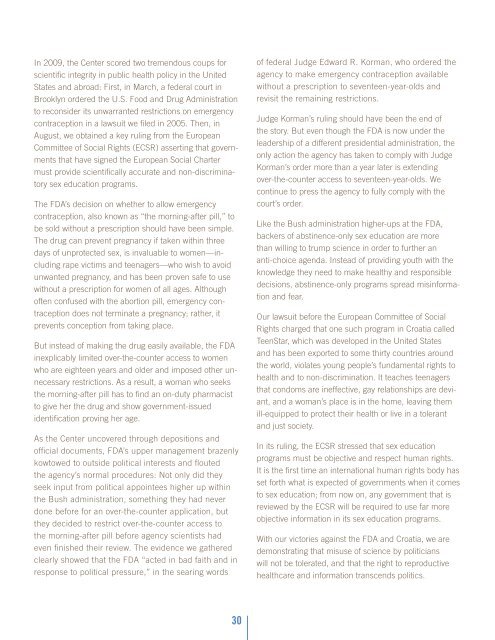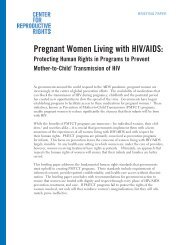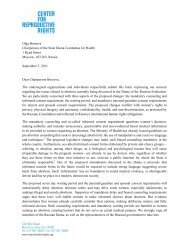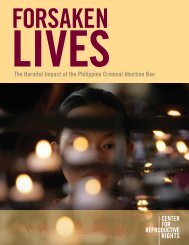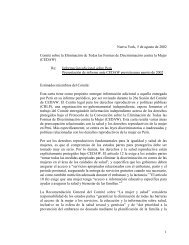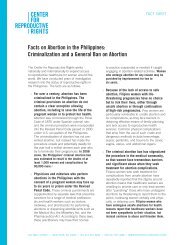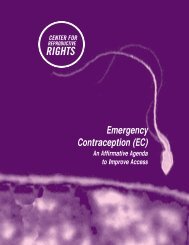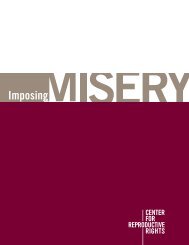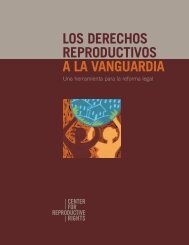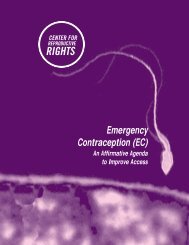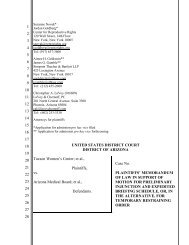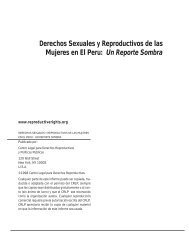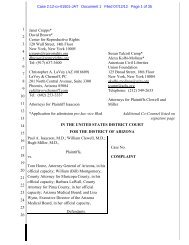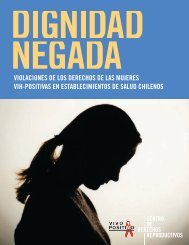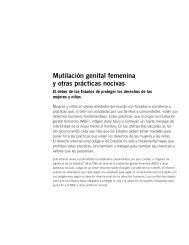CRR Annual Report 2009 - Center for Reproductive Rights
CRR Annual Report 2009 - Center for Reproductive Rights
CRR Annual Report 2009 - Center for Reproductive Rights
You also want an ePaper? Increase the reach of your titles
YUMPU automatically turns print PDFs into web optimized ePapers that Google loves.
In <strong>2009</strong>, the <strong>Center</strong> scored two tremendous coups <strong>for</strong><br />
scientific integrity in public health policy in the United<br />
States and abroad: First, in March, a federal court in<br />
Brooklyn ordered the U.S. Food and Drug Administration<br />
to reconsider its unwarranted restrictions on emergency<br />
contraception in a lawsuit we filed in 2005. Then, in<br />
August, we obtained a key ruling from the European<br />
Committee of Social <strong>Rights</strong> (ECSR) asserting that governments<br />
that have signed the European Social Charter<br />
must provide scientifically accurate and non-discriminatory<br />
sex education programs.<br />
The FDA’s decision on whether to allow emergency<br />
contraception, also known as “the morning-after pill,” to<br />
be sold without a prescription should have been simple.<br />
The drug can prevent pregnancy if taken within three<br />
days of unprotected sex, is invaluable to women—including<br />
rape victims and teenagers—who wish to avoid<br />
unwanted pregnancy, and has been proven safe to use<br />
without a prescription <strong>for</strong> women of all ages. Although<br />
often confused with the abortion pill, emergency contraception<br />
does not terminate a pregnancy; rather, it<br />
prevents conception from taking place.<br />
But instead of making the drug easily available, the FDA<br />
inexplicably limited over-the-counter access to women<br />
who are eighteen years and older and imposed other unnecessary<br />
restrictions. As a result, a woman who seeks<br />
the morning-after pill has to find an on-duty pharmacist<br />
to give her the drug and show government-issued<br />
identification proving her age.<br />
As the <strong>Center</strong> uncovered through depositions and<br />
official documents, FDA’s upper management brazenly<br />
kowtowed to outside political interests and flouted<br />
the agency’s normal procedures: Not only did they<br />
seek input from political appointees higher up within<br />
the Bush administration, something they had never<br />
done be<strong>for</strong>e <strong>for</strong> an over-the-counter application, but<br />
they decided to restrict over-the-counter access to<br />
the morning-after pill be<strong>for</strong>e agency scientists had<br />
even finished their review. The evidence we gathered<br />
clearly showed that the FDA “acted in bad faith and in<br />
response to political pressure,” in the searing words<br />
of federal Judge Edward R. Korman, who ordered the<br />
agency to make emergency contraception available<br />
without a prescription to seventeen-year-olds and<br />
revisit the remaining restrictions.<br />
Judge Korman’s ruling should have been the end of<br />
the story. But even though the FDA is now under the<br />
leadership of a different presidential administration, the<br />
only action the agency has taken to comply with Judge<br />
Korman’s order more than a year later is extending<br />
over-the-counter access to seventeen-year-olds. We<br />
continue to press the agency to fully comply with the<br />
court’s order.<br />
Like the Bush administration higher-ups at the FDA,<br />
backers of abstinence-only sex education are more<br />
than willing to trump science in order to further an<br />
anti-choice agenda. Instead of providing youth with the<br />
knowledge they need to make healthy and responsible<br />
decisions, abstinence-only programs spread misin<strong>for</strong>mation<br />
and fear.<br />
Our lawsuit be<strong>for</strong>e the European Committee of Social<br />
<strong>Rights</strong> charged that one such program in Croatia called<br />
TeenStar, which was developed in the United States<br />
and has been exported to some thirty countries around<br />
the world, violates young people’s fundamental rights to<br />
health and to non-discrimination. It teaches teenagers<br />
that condoms are ineffective, gay relationships are deviant,<br />
and a woman’s place is in the home, leaving them<br />
ill-equipped to protect their health or live in a tolerant<br />
and just society.<br />
In its ruling, the ECSR stressed that sex education<br />
programs must be objective and respect human rights.<br />
It is the first time an international human rights body has<br />
set <strong>for</strong>th what is expected of governments when it comes<br />
to sex education; from now on, any government that is<br />
reviewed by the ECSR will be required to use far more<br />
objective in<strong>for</strong>mation in its sex education programs.<br />
With our victories against the FDA and Croatia, we are<br />
demonstrating that misuse of science by politicians<br />
will not be tolerated, and that the right to reproductive<br />
healthcare and in<strong>for</strong>mation transcends politics.<br />
30


